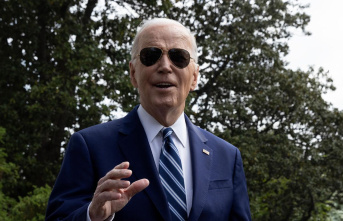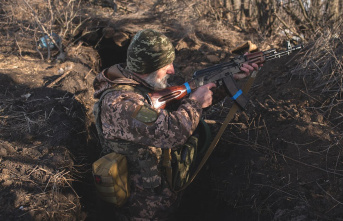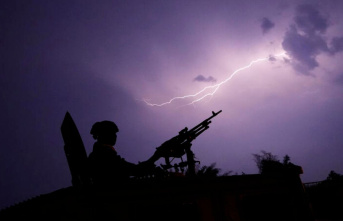Following the recent executions in Iran, the European Union has tightened its sanctions against the Islamic Republic. According to diplomats, the EU foreign ministers put a total of 37 other Iranian leaders and organizations on the sanctions list in Brussels on Monday. There was no decision to classify the Iranian Revolutionary Guards as "terrorist". Tehran had warned the EU against such a step.
"The EU strongly condemns the brutal and disproportionate use of force by the Iranian authorities against peaceful demonstrators," said Sweden's Foreign Minister Tobias Billstrom, whose country currently holds the EU Council Presidency. According to diplomats, the fourth sanctions package approved by the foreign ministers provides for entry and asset freezes against 18 responsible persons and 19 organizations. A total of almost a hundred names are on the EU sanctions list, including members of the Revolutionary Guards.
"The Revolutionary Guards terrorize their own population every day," said Federal Foreign Minister Annalena Baerbock (Greens) in Brussels. According to diplomats, the EU is also reacting to the execution of four death sentences in connection with the anti-government protests.
Baerbock was cautious about the demands of the European Parliament and her Green Party to put the Iranian Revolutionary Guards on the EU list of terrorist organizations. This is a "more than complex" undertaking, emphasized the Green politician, who had initially called for the step herself. The Revolutionary Guards, set up in Iran with the Islamic revolution in 1979, are considered the elite unit within the Iranian armed forces.
The EU foreign policy chief Josep Borrell sees high legal hurdles for classification as a terrorist organization. In at least one member state, a court must convict the group of terrorism, said the Spaniard. "Then we can do our work at European level, but the court decision must come first."
The Iranian opposition accuses the EU of being too considerate of Tehran. It is believed that Borrell wants to keep the door open for further negotiations on the nuclear deal with Iran.
France and Belgium called on the EU to increase pressure on Tehran. Iran is taking European citizens as "hostages," said French Foreign Minister Catherine Colonna. The governments in Paris and Brussels are demanding the release of their own citizens who have been held in Iran for months.
Great Britain, on the other hand, has decided on further sanctions against the country. The British Foreign Office announced on Monday that the paramilitary Basij militia and several officials in the Iranian leadership had been sanctioned.
"Those being sanctioned today (...) are at the center of the regime's brutal repression of the Iranian people," said Secretary of State James Cleverly in a statement. With the sanctions, Britain and its international partners wanted to send a clear message that "there will be no hiding place for those guilty of the worst human rights abuses".
The Basij-e Mostasafin (Mobilized of the Oppressed) is a paramilitary unit in Iran. Formed after the Islamic Revolution in 1979 and recruited from young sections of society, the militia plays a central role in suppressing protests in the country. The militia is part of the Revolutionary Guards and is said to have several hundred thousand supporters loyal to the system.
In addition to the militia, Kiumars Heydari is also on the British sanctions list - he is the commander of the Iranian ground forces. The EU has already imposed sanctions on him and the Basij militia.











